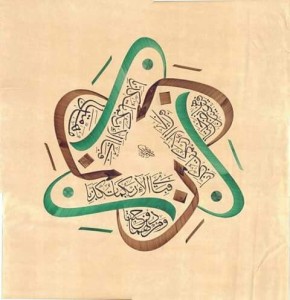 (Source: Adopted from the work of Shaykh Abu Adam al-Naruji)
(Source: Adopted from the work of Shaykh Abu Adam al-Naruji)
Question: I have a question regarding atomism that the Salafis are charging on us Sunnis. Do the Ashari really believe that the atom is perpetual in the sense that it itself is not an accident? So, this is one special object that exists, all else is accident? And this one special object is the common composition of everything? I know about there not being an infinitely indivisible particle, but my question is regarding its perpetuality. Should not this small special object “the atom” be an accident itself, as God would have to recreate it at every instant. So then everything in the universe is an accident according to the Asharis but based on the existence of this indivisible particle?
One of their academics says: “For the Asharites, the only perpetual object is the atom. The atom itself is created at a specific point in time, but after that time, it remains in creation until God wills otherwise.”
Answer: First of all never say “God would have to recreate it,” because God does not have to do anything. This is one of the most important principles of belief (Imam al Ghazali was quoted on this earlier, from his Incoherence of the Philosopher).
Second, using the word “atom” is a bit misleading. Asharis do not hold that the atom is the jawhar, the indivisible element of physical things.
As for your question: They are all things that have a beginning. “Accidents” or `arad, better translated as “incidental characteristics”, in my opinion, are simply attributes of the indivisible element (jawhar) that bodies are made of. None of them can exist without the other, but the indivisible elements are more lasting, because if there is a change in a body, then the `arad has changed, but the jawhars presumably remain the same. That is why they are longer lasting, but not perpetual in an absolute sense, only relative to the `arad. On the other hand, a jawhar cannot be without being either moving or still, so you cannot have a jawhar without `arad, because movement and stillness are `arad.
The academic appears to be a mushabbih, that is why he says things like “The atom itself is created at a specific point in time, but after that time, it remains in creation until Allah wills otherwise.” He imagines this is the Ashari position, because he seems to think that Allah, after creating something, might just take a break from it and leave it until He wills for it to be no more. This is equivalent to the Judeo-Christian belief that the creator took a rest on the 7th day. He has the same position on causation. He says that once a thing has been given a power to cause things, to actually influence events, it can be left alone to do its own thing under supervision, in his opinion. Here are his exact words: “Rather, Allah has created each and every substance with intrinsic properties, and these properties may in fact effect other substances if Allah allows them to.” This belief is one of the origins of shirk, because it explicitly states that Allah’s power is shareable.
This belief in complete or partial rest comes from the methodology of thinking of Allah in terms of created things. The mushabbihah believe that Allah’s actions are sequential events: doing one thing and then another and another and so on (while Allah isn’t bound by time and the complexity of his actions, from the perspective of His existence, are not limited by the sequence of time). Actually though, Allah’s actions are not events, they do not start or stop, they are not sequential, they are not in time. They are without a how.
Asharis, on the contrary to what was proposed by the academic, believe that neither a change nor a lasting existence happens even for a moment without Allah having specified and created that. Nothing is ever acting without Allah having specified and created that act to the last detail. This is because every moment of existence for a created thing is only a possibility, so if Allah has not willed for its existence in the next moment, it will not exist.

